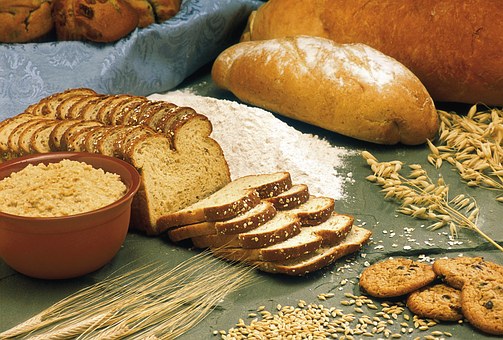Whole Grains Explained
© HealthyMuslim. See Terms and Conditions

Whole grains contain all the essential parts and naturally-occurring nutrients of the entire grain seed. This includes all three parts of the kernel; the bran, germ and endosperm. Refining the grain usually removes the bran and the germ, leaving only the endosperm. Without the bran and germ, about 25% of a grain's protein is lost, along with at least seventeen key nutrients.
Common wholegrain products include:
- Rolled oats and oatmeal
- Whole wheat flour
- Whole wheat bread
- Brown rice
- Corn, including cornmeal and popcorn
- Hulled (not pearled) barley
- Sprouted grains
Whole grains Are Nutritionally Superior
Whole-grain foods are nutrient-dense, meaning they pack many nutrients into a small package. They are high in fiber, low in calories, a rich source of complex carbohydrates, and also contain protein, and a small amount of fat.
Findings from Cornell University report that whole grains contain protective antioxidants in quantities rivaling or exceeding those in fruits and vegetables. corn, for instance, has almost twice the antioxidant activity of apples, while wheat and oats almost equal broccoli and spinach in antioxidant activity. (American Institute for cancer Research (AICR) International Conference on Food, nutrition and cancer, Nov. 2004)
Antioxidants like Vitamin E are found in whole grains in high levels. Vitamin E helps to protect against inflammation and damage caused by free radicals, which is associated with leading to cancer. Phytosterols, another type of antioxidant found in whole grains, helps to regulate cholesterol levels, keeping blood vessels healthy. Whole grains also contain magnesium, potassium, and folate.
Whole grains are a great source of fiber, both insoluble and soluble forms of fiber. This not only promotes digestive health by moving food through the digestive system more smoothly, but also protects against digestive diseases like colorectal cancer.
Health Benefits of whole grains
In addition to digestive health, research has linked whole grain products and whole grains in general to a range of health benefits. The following are some of the benefits that repeated studies have linked to the consumption of whole grains:
- Reduces the risk of stroke - Researchers at Harvard University analyzed data from 75,521 participants. They found that those who ate the most whole grains - the equivalent of two to three slices of whole-grain bread daily - were 30 percent to 40 percent less likely to have an ischemic stroke than women who ate less than half a slice or the equivalent daily. (JAMA, Sep 2000; 284: 1534 - 1540)
- Reduces the risk of type 2 diabetes - Researchers from the Harvard School of Public health, examined data from six studies, and found that a two-servings a day increment in whole grain consumption was associated with a 21% decrease in risk of type 2 diabetes. (PLoS medicine, August 2007; 28;4(8):e261)
- Reduces the risk of heart disease - after following over 21,000 subjects for almost 20 years, researchers from Harvard found that those eating two to six servings of whole grain cereal a week reduced their risk of heart failure by 22%, while those eating whole grains daily reduced their risk by 28%. (Archives of Internal medicine, October 2007; 167: 2080-2085)
- Better weight maintenance - A team of Dutch researchers studied over 4000 men and women aged 55-69 years, and found that higher whole grain consumption was associated with lower BMI and a reduced risk of overweight and obesity. For every additional gram of whole grain consumption, men's risk dropped 10% and women's risk dropped 4%. (European J of Clinical nutrition (January 2009) 63, 31-38)
Other benefits of whole grains on health as indicated by recent studies include:
- reduced risk of asthma
- healthier carotid arteries
- reduction of inflammatory disease risk
- lower risk of colorectal cancer
- healthier blood pressure levels
- less gum disease and tooth loss
This link provides a comprehensive summary of research on whole grains and their benefits for health.
Enriched grains
Many products such as flour and bread are labeled as "enriched". Enriched means the grains used were refined during processing by removing the bran and germ, which is where all the fiber and nutrients are. Refining makes grains less chewy, easier for manufacturers to use in packaged foods, and gives foods a longer shelf life. To make up for the lost nutrients, manufacturers add B vitamins and minerals, along with folic acid back into the product, which is why they are referred to as "enriched."
Whole grains don't need to be enriched because they already contain many of these beneficial nutrients, so choose whole grain instead of enriched .
Link to this article: Show: HTML Link • Full Link • Short Link
Share or Bookmark this page: You will need to have an account with the selected service in order to post links or bookmark this page.





|
Related Articles:
- Unrefined Wheat Is A Highly Nutritious, Energy-Providing Food
- Oats Are Packed With Health-Promoting Benefits
- Health Benefits of Corn
- Soak Your Grains for Maximum Benefit
- Ibn al-Qayyim: Barley Has Many Healing Properties
- Talbina: Relaxation For the Heart of the Sick Person
- Ibn al-Qayyim: Rice is a Nourishing Grain
- Flax Seed, Black Seed Oil and Honey Oat Porridge - Absolutely Great For Your Health
You must be registered and logged in to comment.
Most Popular
Latest Articles
Popular Subjects
Health, fitness and longevity
Based upon the principles of health
in the Qur'an and Prophetic Traditions.
HealthyMuslim.Com
There are two bounties in which
most people lose out: good health
and free time. Al-Bukhari.























